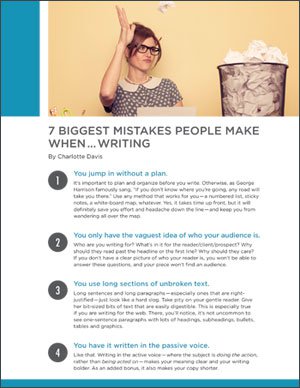7 Biggest Mistakes People Make When...Writing
Jan. 25, 2017

1. You jump in without a plan.
It’s important to plan and organize before you write. Otherwise, as George Harrison famously sang, “If you don’t know where you’re going, any road will take you there.” Use any method that works for you — a numbered list, sticky notes, a white-board map, whatever. Yes, it takes time up front, but it will definitely save you effort and headache down the line — and keep you from wandering all over the map.
2. You only have the vaguest idea of who your audience is.
Who are you writing for? What’s in it for the reader/client/prospect? Why should they read past the headline or the first line? Why should they care? If you don’t have a clear picture of who your reader is, you won’t be able to answer these questions, and your piece won’t find an audience.
3. You use long sections of unbroken text.
Long sentences and long paragraphs — especially ones that are right-justified — just look like a hard slog. Take pity on your gentle reader. Give her bit-sized bits of text that are easily digestible. This is especially true if you are writing for the web. There, you’ll notice, it’s not uncommon to see one-sentence paragraphs with lots of headings, subheadings, bullets, tables and graphics.
4. You have it written in the passive voice.
Like that. Writing in the active voice — where the subject is doing the action, rather than being acted on — makes your meaning clear and your writing bolder. As an added bonus, it also makes your copy shorter.
5. You use jargon, buzz words and corporate speak.
These are sometimes called “weasel words.” Be on high alert for these villains and whack them on the head with a big club whenever you see one. Switching to simpler, more common words won’t make you look dumb. What it will do is make your writing more approachable and easier to understand.
6. You rely on spell check for proofreading.
I know, I care about the trees too, but believe me, you simply cannot do a proper review on a screen. Print your piece out for proofreading. Read it out loud. How does it sound? Does it flow? Are your sentences too long? (See #3 above.) Consider getting someone else to proofread for you. Chances are, once you’ve taken the time to plan and draft and edit and tweak, you are waaay too close to your piece to see even the most obvious things that should be fixed.
7. You hold off until the end to reveal your most important message.
I used to work with a group of super-smart engineers. Logical by nature and trained in the scientific method, they wrote articles like academic papers — a great introduction, a lengthy discussion of the methodology, and finally, in the last paragraph…wait for it…the results! The problem is, for most writing, you can’t expect your reader to follow along until you make the big reveal at the end.
In the information age, you need to think like a journalist and remember your five friends: Who, What, When, Where, How. In other words, you want to try to hook your reader by putting your main point up front.
Once hooked, however, your reader will likely go the distance, provided you also follow all the other tips. Writing well — and with clarity — can be learned, but it does take practice. Why not get started today?
Download article in PDF format
Writing Tips & Tools

